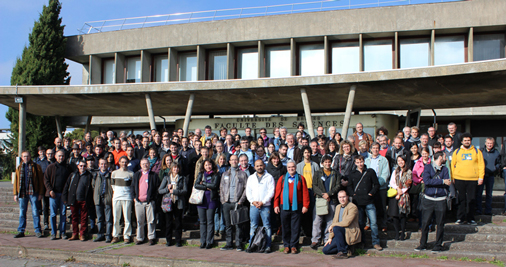October 27-30, 2014, Rennes

145 participants under the Sun of Brittany.
The French National Program of Physique et Chimie des Milieux Interstellaire et Circumstellaire (PCMI) drives researches between physicists, chemists, and astrophysicists to progress in the understanding of the circumstellar and interstellar medium in our Galaxy and in external galaxies. PCMI organizes its biennial conference in Rennes (Brittany) on Oct. 27-30 2014. We list below some hot topics relevant to the following 3 themes.
The interstellar medium (ISM) from the Milky Way to far external galaxies: Many questions remain in the study of the ISM in our Galaxy: for instance, the role of magneto-hydrodynamic instabilities in the structuration of the ISM, the contribution of dark molecular gas to the mass budget of molecular clouds, the role played by the energy injection channels on the star formation efficiency, or the concept of stability in a medium where kinematics/dynamics compete with thermodynamics. Moreover, the studies of the ISM rely on diverse tracers that probe diffuse and/or dense gas, implying the possibility to classify these different phases. Once developed, these classification tools will be applied to the understanding of extragalactic sources.
From molecular clouds to protoplanetary systems: The evolution of molecular clouds to form new stars and protoplanetary systems rises many questions, e.g., the role of magnetic field in the structuration of the ISM in filaments and then in dense cores, the nature of the microphysics mechanisms that determine the multiplicity of young stars, the coupling between gas and dust, but also the effect of dust growth/sedimentation on the structure of protoplanetary disk. The choice of the pertinent molecular tracers to address these different issues is crucial: Are there good tracers for all the phases of evolution? Do these tracers adequately describe the chemistry and the physics of the medium?
On the origin of matter complexity: The conference will discuss fondamental questions on the origin, evolution and complexification of matter in space, as well as the associated processes and the diagnostics: For instance, the origin and formation of interstellar grains, the cycle and evolution of carbonaceous matter, the interpretation of the IR emission of the diffuse medium, the mechanisms of formation of H2 in and outside our Galaxy (primordial universe, low metallicity galaxies), the formation of complex molecules, and the chemistry at very low temperatures with/without strong UV fields, the limit of the molecular complexity in space, the emergence of new astrophysical diagnostics supported by state-to-state ab-initio computations.
We expect a large audience to discuss these questions and others. PCMI is an "action sur projet" from CNRS-INSU (Sciences de l'Univers), also supported by the CNRS-INP (Institute of Physics), the CNRS-INC (Institute of Chemistry), and CNES (Centre National d'Études Spatiales).

